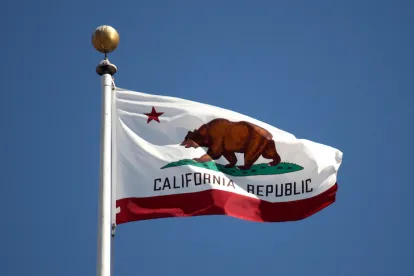Highlights
A pair of new California laws add COVID-19 reporting obligations for employers and expand workers’ compensation presumptions
AB 685 makes certain COVID-19 outbreaks reportable to CAL-OSHA
SB 1159 codifies and refines the earlier presumption of workers’ compensation coverage for covered employees who contract COVID-19
In another move to combat the impact of COVID-19 on businesses, effective Sept. 17, 2020, California’s Gov. Gavin Newsom signed two bills expanding employee protections related to COVID-19.
California Assembly Bill (AB) 685 requires employers to provide employees with notice that they may have been exposed to COVID-19 within one business day. And SB 1159 expands first responders’ workers’ compensation access, due to the pandemic.
According to the governor, “Protecting workers is critical to slowing the spread of this virus” and the new legislation “will help California workers stay safe at work and get the support they need if they are exposed to COVID-19.”
New Notice Requirements for Potential Employee COVID-19 Exposure
AB 685 obliges employers to report COVID-19 cases that meet the definition of a “serious occupational injury or illness” to employees and the California Division of Occupational Safety and Health (Cal OSHA). This notice requirement presupposes that employers have both a process for employees to report potential COVID-19 exposure and the ability to determine whether Cal OSHA regulations require reporting of a particular case.
Specifically, the law says employers who have notice of a potential COVID-19 exposure must provide written notice to permanent and subcontractor employees who were at the worksite at the same time as a potentially infected person. Notice to the employees’ exclusive representative (if any) also is required. Employers must provide the notice, via a method typically used to communicate employment-related information, within one business day of learning of a possible COVID-19 exposure.
The notice should protect employee privacy, identity and personal health data. It must also inform the recipient of COVID-19 sick pay and leave benefits and the employer’s implemented and/or planned disinfection and safety plan (per guidance from the Centers for Disease Control and Prevention).
With regard to Cal OSHA, the new law authorizes the agency to act when, “in its opinion,” employees’ exposure to COVID-19 in the workplace is an “imminent hazard.” The agency may issue citations, bar access to the worksite, shut down operations, and require employer postings disclosing an imminent hazard.
Employers also must contact their local public health department if the number of COVID-19 cases about which the employer knows constitutes a COVID-19 outbreak, as defined by the California State Department of Public Health. In this instance, employers have 48 hours to notify the public health department and must be prepared to provide it with the number of COVID-19 cases at the workplace, employee names, and other pertinent information.
Employers are required to maintain records of written notifications for at least three years, according to the new law.
Expanding Workers’ Compensation for Frontline Workers and Notice Requirements
SB 1159 expands access to workers’ compensation by making it easier for first responders, healthcare workers, and other employees who test positive for COVID-19 due to a workplace outbreak to receive workers’ compensation benefits. It also imposes significant notice requirements on employers. These provisions, codified as Labor Code Sections 3212.86-3212.88, are effective immediately as urgent legislation.
Disputable Presumption of Workers’ Compensation Coverage
The new law creates a presumption that illness or death resulting from contracting COVID-19 arose out of and in the course and scope of employment. This presumption applies to employees 1) who test positive during a COVID-19 outbreak at their “specific place of employment” and 2) whose employer has at least five employees. A “specific place of employment” excludes an employee’s home or residence (unless the employee performs home health care services at a home or residence).
In addition:
- The employee must test positive for COVID-19 within 14 days after a day the employee worked at their specific place of employment at the employer’s direction.
- The day of work must have been on or after July 6, 2020, which must be the last date the employee worked before the positive test.
Under Labor Code Section 3212.88, an “outbreak” exists if, within 14 calendar days, one of the following occurs at a specific place of employment:
- Of 100 employees or fewer at a specific place of employment, four employees test positive for COVID-19
- Of more than 100 employees at a specific place of employment, 4 percent of employees positive for COVID-19
- A local public health agency, the state Department of Public Health, Cal OSHA or a school superintendent orders a specific place of employment closed due to the risk of infection with COVID-19
An employer may dispute the presumption with evidence that 1) it implemented measures to reduce potential COVID-19 transmission at the worksite, 2) the employee had non-occupational risks of COVID-19 infection, 3) the employee made damaging statements, and 4) any other evidence that an employer normally uses to dispute an alleged work-related injury. The current “disputable presumption” is in effect from July 6, 2020, through Jan. 1, 2023.
Notification to Workers’ Compensation Carriers
If the injury occurred before July 6, 2020, or the employee is an essential worker under Labor Code Section 3212.87 (including certain firefighters, peace officers, frontline healthcare providers and facility workers), employers with at least five employees must, within the next 30 days, provide their workers’ compensation carrier with information about employees who tested positive for COVID-19. From there, the claim administrator has 30 days to deny the claim.
If the injury occurred after July 6, 2020, then the claim administrator has 45 days to deny the claim.
Absent a timely denial, the injury is presumably compensable, a presumption that may be rebutted only with evidence discovered after the investigation or denial period.
It is essential that employers comply with these reporting requirements, as the new law includes a steep penalty for any employer that “intentionally submits false or misleading information or fails to submit information.”








 />i
/>i
